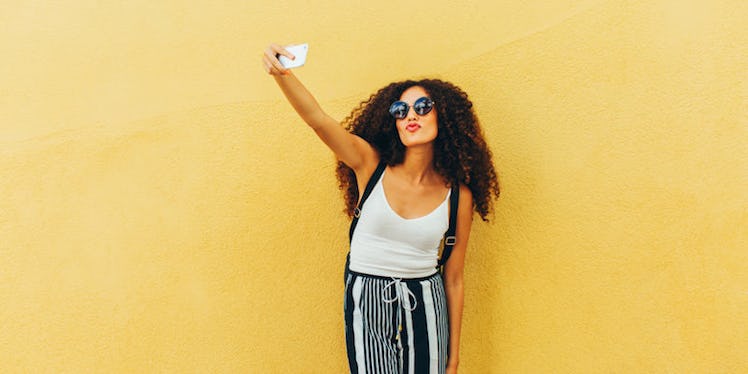
The Unexpected Reason Snapchat's 'Pretty' Filters Hurt Your Self-Esteem
I was sitting on my couch, taking a selfie for my best friend when it hit me: With this filter on, is there anything I can do to actually look unattractive?
It was 7 or 8 pm, hours after work, and what was left of my makeup merged into the sloppy bun on top of my head. The resulting aesthetic couldn't have been further from the polished, fashionable person I'd been at 8 am that morning.
The Snapchat filter I'd picked — all gold twinkles and gently fluttering butterflies — was a blatant attempt to cover up the pimple sprouting from my cheek and the humidity tendrils curling around my face. But as I looked at those bronze cheekbones, clearly stolen from Kiera Knightley and glued to my face by some kind of technological magic, something snapped inside me.
Pulling my chin backward like some kind of demented turtle, I pushed my chest forward to create five or so rippling chins. In the gold filter, I still would have passed for a Sports Illustrated model. It was strangely maddening.
Brain gears whirring, I flipped through a succession of Snapchat's lenses. The puppy nose, the blue “pretty” filter — all of them visibly thinned my face and lightened my skin, adding lip color where my mouth had previously erred on the side of “corpse-y.”
Over the course of the day, I open dozens of Snaps from friends. If looking at badly Photoshopped Victoria's Secret ads is bad for our self-esteem, then what is a live-action beautifying app doing?
No amount of gold butterfly snapchat filter is gonna hide ya ugly personality — Kirsty Scarrott (@kirstyscarrott) July 31, 2016
It's important to note I'm not the first person in the history of Snapchat to notice something very odd is going on. BuzzFeed gathered plenty of tweets wondering if the aforementioned filters really just lighten skin color and minimize ethnic features, making noses smaller and eyes wider. Many a female essayist has put words to page expressing how it feels to have an app make you “better,” whatever that standard means for a tech geek.
There are two very concrete problems with digitally manipulated images. First, seeing women who seem to be effortlessly perfect creates the impression that everyone but you just naturally looks that way. It's much more difficult to make your brain realize they've been edited. The same happens in live action on Snapchat, when your brain starts accepting that image as the norm.
Manipulating aside, it's tough to realize Snapchat's beauty filters immediately take pounds off your face, selling the all-too-popular idea that there's only one way to be attractive. The same social media that used to provide a way to send an unfiltered selfie to friends has now become a beauty pageant.
Why can't I send a picture that's just a picture? Why does everything have to be a competition for who can pretend to be the most effortlessly beautiful?
If you've spent any time on Snapchat recently, you've probably seen the Kardashian family's use of filters. Mesmerized by their own, puppy-fied reflections like Narcissus staring at his own reflection, they trail off mid-thought and stare vacantly into their own eyes. If the Kardashian family was the first to publicly seek the perfection of Photoshop in real life, Snapchat is their communal wet dream.
Researchers have found connections between Photoshop manipulation and self-esteem, eating disorders and self hatred. What starts as an innocently “beautiful” photo becomes problematic to all those seeing it. Now, imagine the perfect one is you and not some undersize Ralph Lauren model in a print ad.
Like every kind of social media, Snapchat is a company with its own agenda. It wants to flatter and persuade you to keep using it, but has no obligation to tell you the truth or take responsibility.
What I'm saying is this: Snap carefully. Beauty is in the eye of app holder.